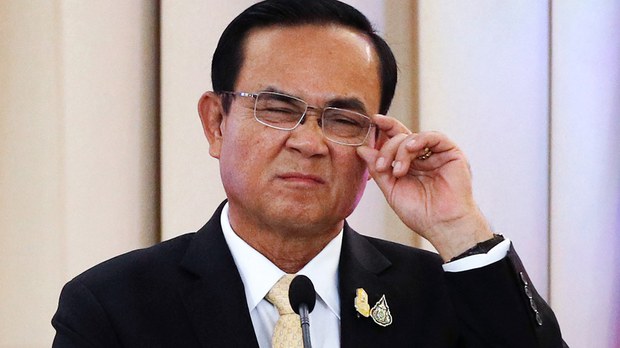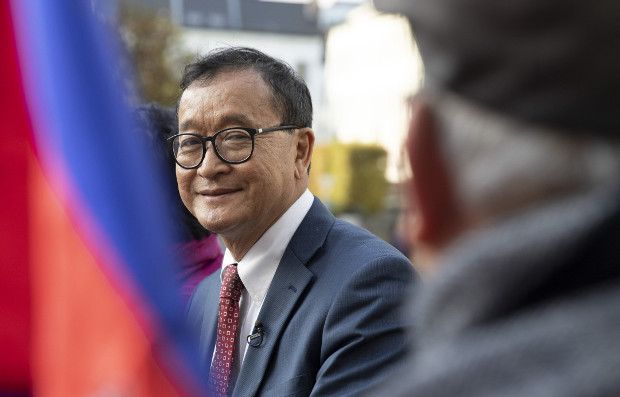Thailand Refuses Entry to Cambodia Opposition Leader Sam Rainsy Ahead of Repatriation Bid
2019.11.06
Bangkok, Jakarta and Kuala Lumpur
 Thailand's Prime Minister Prayuth Chan-O-Cha reacts during a press conference at Government House in Bangkok, Nov. 5, 2019.
Thailand's Prime Minister Prayuth Chan-O-Cha reacts during a press conference at Government House in Bangkok, Nov. 5, 2019.
Thailand made clear Wednesday that it would not allow Cambodian opposition leader Sam Rainsy into the country, likely derailing his plans to return home from self-imposed exile through the common border of the two countries.
The Cambodian government has vowed to arrest Sam Rainsy, the leader of the Cambodia National Rescue Party (CNRP), if he returns home and has warned of action against any airlines that brings him into the country.
In announcing the decision to prevent Sam Rainsy from entering Thailand, Prime Minister Prayuth Chan-ocha cited its obligations as a member of the Association of Southeast Asian Nations (ASEAN) to refrain from meddling in the affairs of its neighboring nation.
“According to our commitment to ASEAN, we will not interfere in each other’s internal affairs, and we will not allow an anti-government person to use Thailand for activism,” Prayuth told reporters.
“I have ordered this, so he won’t be able to enter the country.”
Thailand may represent Sam Rainsy’s best chance as a country from which to launch his bid to reenter Cambodia, where he remains popular even though he faces at least 18 years in jail on wideranging charges from defamation to insulting the King.
Sam Rainsy said he was ready to go to jail or die for the cause of restoring democracy in Cambodia, vowing to return home on Nov. 9 in the face of threats by authoritarian Cambodian Prime Minister Hun Sen, who has vowed to jail him if he sets foot in the country.
Other senior CNRP officials seeking to assist in preparations for his return have met with resistance in Malaysia and Indonesia, while Laos has indicated it will not allow passage for members of the opposition and Vietnam’s one-party Communist government is unlikely to support anyone advocating regime change.
Speaking from Berlin, where he was scheduled to board a flight later on Wednesday to an undisclosed location, Sam Rainsy told Radio Free Asia, a sister entity of BenarNews, that there had been no “official response” from Thailand about his status, and said he is “still hopeful” that the Thai government will “soften its stance, in order to help restore democracy in Cambodia.”
But he said that he and other senior CNRP officials “are determined to return to Cambodia to help the Cambodian people,” adding that there are “many ways and means” through which to do so.
“Our intention is to gather with supporters at the Poipet checkpoint—the main border crossing into Cambodia [from Thailand’s Aranya Pratet township],” he said.
“Some people have already arrived and others will be arriving tomorrow or the day after tomorrow. Everyone should be in place before Nov. 9, and in the morning we will walk into Cambodia.”
Sam Rainsy fled Cambodia to France in 2015 to avoid a string of charges and convictions he says were politically motivated, and since his departure, authorities arrested CNRP president Kem Sokha on charges of “treason” in September 2017 and the Supreme Court dissolved the opposition party for its role in an alleged plot to overthrow the government two months later.
The ban on the political opposition, along with a wider crackdown by Hun Sen on NGOs and the independent media, paved the way for his ruling Cambodian People’s Party (CPP) to win all 125 seats in parliament in the country’s July 2018 general election.
Hun Sen’s government has militarized Cambodia’s border provinces and ordered the armed forces to attack any opposition gatherings held on the date of Sam Rainsy’s planned return, banned commercial airlines that serve the country from boarding the CNRP chief, and sought the cooperation of neighboring countries by issuing arrest warrants to ensure that the return is prevented.

Indonesian incident
Prayuth’s indication that Sam Rainsy will not be allowed into the country came a week after Thailand refused entry to CNRP deputy president Mu Sochua, citing “security concerns.”
Also on Wednesday, Cambodia’s ambassador to Indonesia, Hor Nambora, confronted Mu Sochua as she held a press conference at a hotel in Jakarta to explain the CNRP’s plans.
Hor Nambora called Cambodian opposition leaders “fugitives and criminals” because they had been convicted of plotting a coup. He accused her of misleading Indonesian authorities by traveling to the country on her U.S. passport, despite holding dual citizenship.
Speaking to reporters after the confrontation, Mu Sochua said that she and other CNRP supporters will “risk our lives entering Cambodia unarmed,” adding that the planned return is to protect democracy in the country, “not to carry out a coup d’etat.”
Following the press conference, Cambodia’s embassy issued a statement expressing concern that Indonesia had allowed Mu Sochua to enter the country to “conduct anti-Cambodian activities in Jakarta,” and calling on authorities to arrest her and “deport her to Cambodia immediately in the true spirit of ASEAN.”
Mu Sochua claimed Hor Nambora had told her that Cambodian police were in the hotel and that if she didn’t want to be arrested she should “leave Indonesia right away and not hold a press conference.”
Mu Sochua later flew to Malaysia’s capital Kuala Lumpur, but was prevented from entering the country, although authorities did not provide an official reason for the refusal.
Malaysia’s blocking of Mu Sochua came two days after authorities in the country detained two Cambodian opposition activists, including an asylum seeker, while they waited to board a flight to Thailand. London-based Amnesty International called on Malaysia late on Tuesday to immediately release the pair and ensure they are not deported home, where it said they “face arbitrary arrest and detention.”
Cambodia exports repression
Prayuth’s comments elicited a strongly worded rebuke from former Philippine lawmaker and ASEAN Parliamentarians for Human Rights (APHR) board member Teddy Baguilat, who called the decision “outrageous” and said it would effectively prevent the opposition leader from returning to Cambodia.
“The decision is solely based on political grounds and is a blatant attempt to silence voices of the Cambodian opposition,” Baguilat said.
The U.S. State Department said it is “deeply concerned” by the ongoing arrests and intimidation of CNRP supporters in Cambodia in a statement on Wednesday, calling the actions “an escalation in suppression of the political opposition … [that] raise concerns about respect for the freedoms of peaceful assembly and expression under the Cambodian constitution and the International Covenant on Civil and Political Rights.”
“We call on authorities to stop harassment of the political opposition, protect the constitutional and human rights of all people in Cambodia, and take meaningful steps to reopen political and civic space,” the statement said, adding that all parties should urgently work towards a peaceful process of dialogue and national reconciliation.







